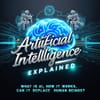Artificial intelligence (AI) is the simulation of human intelligence processes by machines, especially computer systems. It's a broad field that encompasses various techniques, including machine learning, deep learning, and natural language processing. AI systems work by ingesting large amounts of labeled training data, analyzing it for correlations and patterns, and using these patterns to make predictions about future states.
AI programming focuses on cognitive skills such as learning, reasoning, self-correction, and creativity. These skills enable AI systems to acquire data and create rules to transform it into actionable information, choose the right algorithm to reach a desired outcome, continuously learn and tune algorithms for accurate results, and generate new images, text, music, and ideas using neural networks and statistical methods.
AI is transforming various industries, including healthcare, business, education, finance, and entertainment. In healthcare, AI assists in diagnosis, patient care, and disease prevention. In business, AI automates tasks, enhances customer experience, and improves decision-making. In education, AI personalizes learning experiences and automates grading. In finance, AI powers algorithmic trading, credit scoring, and risk management. In entertainment, AI generates content, recommends personalized experiences, and detects fraud.
While AI has made tremendous progress, it's unlikely to replace human beings entirely. AI excels in specific tasks, but it lacks the creativity, empathy, and complex decision-making capabilities of humans. AI is best utilized as a tool to augment human capabilities, freeing us to focus on higher-level tasks that require creativity, problem-solving, and critical thinking.


